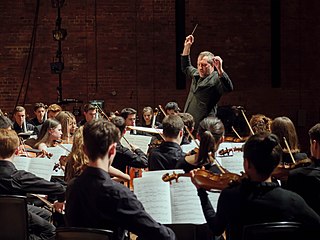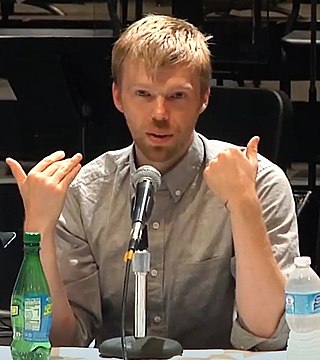
Thomas Joseph Edmund Adès is a British composer, pianist and conductor. Five compositions by Adès received votes in the 2017 Classic Voice poll of the greatest works of art music since 2000: The Tempest (2004), Violin Concerto (2005), Tevot (2007), In Seven Days (2008), and Polaris (2010).

Olga Neuwirth is an Austrian contemporary classical composer, visual artist and author. She gained fame mainly through her operas and music theater works, which often deal with topical and decidedly political themes of identity, violence and intolerance.
Julian Anderson is a British composer and teacher of composition.

Chinary Ung is a composer currently living in California, United States.
António Chagas Rosa is a Portuguese composer of contemporary classical music, considered one of the leading figures of contemporary musical writing of his generation.
Peter Goddard Lieberson was an American composer of contemporary classical music. His song cycles include two finalists for the Pulitzer Prize for Music: Rilke Songs and Neruda Songs; the latter won the 2008 Grawemeyer Award for Music Composition and both were written for his wife, the soprano Lorraine Hunt Lieberson. His three piano concertos were each premiered by the pianist Peter Serkin, with the 1st and 3rd also being Pulitzer finalists.
Hanspeter Kyburz is a contemporary Swiss composer of classical music, known for applying electronic music techniques to his productions.
Đuro Živković, also rendered as Djuro Zivkovic, is a Serbian-Swedish composer and violinist. He has lived in Stockholm, Sweden, since 2000.

Beat Furrer is a Swiss-born Austrian composer and conductor. He has served as professor of composition at the University of Music and Performing Arts Graz since 1991. He was awarded the Ernst von Siemens Music Prize in 2018.
Dai Fujikura is a Japanese-born composer of contemporary classical music.
Richard Ayres is a British composer and music teacher.
David Sawer, is a British composer of opera and choral, orchestral and chamber music.
Rebecca Saunders is a London-born composer who lives and works freelance in Berlin. In a 2017 Classic Voice poll of the greatest works of art music since 2000, Saunders' compositions received the third highest total number of votes (30), surpassed only by the works of Georg Friedrich Haas (49) and Simon Steen-Andersen (35). In 2019, writers of The Guardian ranked Skin (2016) the 16th greatest work of art music since 2000, with Tom Service writing that "Saunders burrows into the interior world of the instruments, and inside the grain of Fraser's voice [...] and finds a revelatory world of heightened feeling."

Theo Verbey was a Dutch composer.
Enno Poppe is a German composer and conductor of classical music, and an academic teacher.
Alexander Moosbrugger is an Austrian Composer, living since 2001 in Berlin.

Andrew Norman is an American composer of contemporary classical music whose texturally complex music is influenced by architecture and the visual arts. His string trio The Companion Guide to Rome (2010), was a runner-up for the 2012 Pulitzer Prize for Music. While composer-in-residence for the Boston Modern Orchestra Project, he first gained international attention for the orchestral work Play (2013), which was nominated for the 2016 Grammy Award for Best Contemporary Classical Composition and won the 2017 Grawemeyer Award for Music Composition. He received another Grammy nomination for the orchestral work Sustain (2018), a commission from the Los Angeles Philharmonic. Other noted works include the fantasy for piano and orchestra Split (2015) and the opera A Trip to the Moon (2017). Since 2020, Norman has been on the composition faculty of the Juilliard School.

Mouvement [Movement ], is a composition for a small ensemble by Helmut Lachenmann, written between 1982 and 1984. The music falls into the genre musique concrète.
Konstantía Gourzí is a Greek composer and conductor. She is professor of ensemble conducting and new music at the University of Music and Performing Arts Munich.

Richard Dünser is an Austrian composer of stage works, orchestral music and chamber music, among others.








